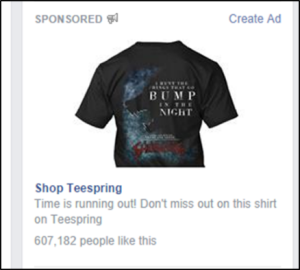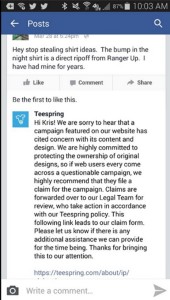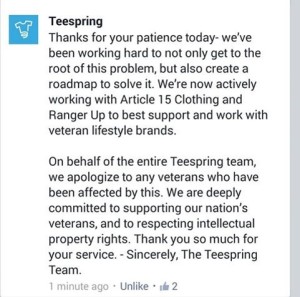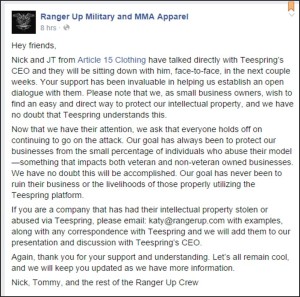UPDATE (1700 hours, 30MAR15): Here are the official reactions to the story below from Teespring, Article 15, and Ranger Up. As you can see, definitive progress is being made. Many thanks to all of you for your support; the veteran community can do great things when we all work together for a common purpose. We will continue to keep you posted, but I think there is high potential for a satisfactory outcome for all involved.
PLEASE CEASE FIRE AND GIVE THE PROCESS A CHANCE TO WORK.
____________________
UPDATE (2130 hours, 29MAR15): A short while ago, the CEO for Teespring, Mr. Walker Williams, reached out to Havok Journal, Ranger Up, and Article 15. The “bump in the night” shirt has been taken down and all parties involved are in currently in discussions for a way ahead.
Teespring Allows People to Rip Off Veterans
You’ve heard of Teespring, right? The site that advertises itself as “the 100% free way to sell high-quality t-shirts?” You haven’t? Well you should, especially if you’re a veteran or if you care about veterans’ issues. Why? Because you should know that Teespring regularly profits from people who rip off veteran businesses and take advantage of veteran consumers… and consequently, whether you are a veteran or not, until they make it right you should never, ever do business with them.
Here’s how Teespring works: if you want a t-shirt made, you access their site, you “build” a t-shirt design, then Teespring prints, sells, and ships the shirts and you both split the profit. But given the fact that you can upload just about anything you want, TeeSpring has the potential to become a veritable clearing house for copyright and trademark infringement. And if you’re a small business, especially a veteran-owned business, apparently Teespring will allow people to rip you off with impunity… and profit while doing it.

I noticed this myself for the first time just yesterday, when a Teespring ad appeared in my Facebook feed. You can see the ad in the image to the right or you can see it for sale on TeeSpring’s website.
Wow! Pretty cool shirt, right? That looks like something that would appeal to the 17-35 year old veteran, fitness enthusiast, and law enforcement demographic, right? I’d certainly wear something like that. But… wait a minute, before I click “buy,” where have I seen that design before?
Oh yeah, I saw the EXACT SAME THING for sale by Ranger Up, a popular veteran-owned small business. The only difference between the Ranger Up poster and the TeeSpring shirt is that someone crudely edited out the Ranger Up logo. I mean, this goes far beyond the “confusingly similar” standard requirement for copyright infringement; these guys aren’t even trying.
Left: Ranger Up’s “Bump in the Night” poster. Right: blatant rip-off of Ranger Up featured on TeeSpring.
And according to Ranger Up CEO Nick Palmisciano, this isn’t the first time someone used Teespring to rip off one of their ideas. When I contacted him for this story, Nick said the following:
We understand that people will steal art from time to time. With companies like Cafe Press and Zazzle, their legal teams are quick to take down infringers. In sharp contrast, TeeSpring ignores everything we send them unless we engage our lawyers. Only then do they acknowledge even the most obvious theft. Our legal bills have tripled as a result of Teespring’s policies and I have yet to see an infringer taken down.”
It’s not just Ranger Up either. Other veteran-run businesses such as Article15 Clothing have faced similar issues. This is from Jarred Taylor, Article 15’s Chief Marketing Officer:
Like other veteran-owned businesses, we have regularly seen our work stolen and offered for sale on Teespring. They, unlike other companies we deal with, seem unwilling to take meaningful steps to combat very conspicuous intellectual property issues, and to compensate those businesses victimized.
We have requested to be contacted directly by the Teespring president, at which time I am going to push for a face to face meeting. I feel the only way for us to solve this problem is to be in the same room as these people and have them see how serious our community is.”
I haven’t yet had time to poll other veteran clothing companies such as Scroll Factory or Grunt Works, but I have a sneaking suspicion that they probably faced similar issues.

Notifying Teespring about the copyright issues doesn’t seem to help, either. When they do choose to respond, it’s usually with a patronizing form letter, like the one on the left.
Why does it take a “legal team” to sort through these kinds of issues? Any reasonable person can look at the evidence I provided above and see the conspicuous ongoing theft of intellectual property. A responsible company would at least put the campaign on hold until this whole thing gets sorted out. But no, while Teespring ignores the problem and the “legal team” does… whatever it is they do (or more likely don’t do) the t-shirt sales go on, and Teespring and the person who designed the shirt still keep splitting the profits. What happens to all that money even if they DO bother to determine that copyright infringement has taken place? Neither Ranger Up nor Article 15 have even seen a nickel from TeeSpring.
Look, when it comes to TeeSpring, we’re not talking a little mom-and-pop store just struggling to survive, or a couple of Girl Scouts using iron-on decals to raise funds for summer camp. Teespring is a HUGE business. So why do they continue to regularly profit from the intellectual property of smaller companies? Most likely, the answer is “because they can.”
What has TeeSpring done to make all of this right? Not much, so far. Given the history that companies like Ranger Up and Article 15 have with Teespring, it seems obvious that they think they can ignore veterans and profit from veterans’ ideas and labor. In fact, Ranger Up and Article 15 are two of the biggest veteran-owned companies of their type out there; if TeeSpring won’t take them seriously, what’s it going to take to get veterans’ voices heard, and for TeeSpring to start taking the veteran community seriously? Well, Article 15’s Jarred Taylor has some ideas:
One thing that differs us from most other demographics is that our community will boycott this company if they choose to ignore us. In addition to boycotting, they will spread the word at an alarming rate, which Teespring could see their business drastically affected.”
A boycott sounds good to me! By allowing these kinds of practices to go on, Teespring not only profits directly from intellectual property theft, they are allowing an inferior product to be sold at a higher price to the prime veteran demographic. So, when do we start? Tens of thousands of veterans are standing by to provide supporting fires.
What Teespring and other companies like them might not realize is that while veterans make up a small percentage of the overall US population, there are still a LOT of us out there. We are well-organized and vocal, and we protect our own. TeeSpring needs to start making things right with the veteran community NOW, or boycotts, social media campaigns, and legal action are likely to ensue.

Fellow veterans and veteran supporters, it’s not like Teespring doesn’t know the law; there’s a whole page dedicated to it on their website. So why are sites like Ranger Up and Article15, and probably other veteran-owned businesses as well taken advantage of in this way? My guess is that it’s because Teespring and their arsenal of corporate lawyers are completely comfortable ignoring complaints from small business owners like the ones mentioned because they feel veterans’ pockets aren’t deep enough to fight for their rights in court.
But surely, there is a veterans’ advocacy lawyer out there willing to take this on? Given the scale of the thefts and Teespring’s willingness to profit from it by ignoring flagrant copyright violations, perhaps a class action suit is in order? It looks like there is already some precedence for legal action against Teespring out there. Maybe a member of Congress would like to make some inquiries? There are probably a few veterans who are now Congressmen or Senators and could start asking some very pointed questions.
I wonder how many other businesses have been ripped off by people exploiting Teespring and would join in a lawsuit. My email address is at the bottom of this article, I’d love to hear from any other business who has had copyright, trademark, or intellectual property issues with Teespring. Also, if a Teespring representative reads this article and actually cares enough to take the time to respond, I’ll happily consider running their side of the story in a separate article. I’ll also post an update if Teespring makes things right with Ranger Up, Article 15, and any other veteran-owned businesses out there who have had similar issues.
In the meantime, look at the evidence I provided above and make up your own minds. If you think that Teespring is making a profit at the expense of veteran small business owners, and I think the evidence is overwhelming that they are, feel free to suggest a law firm or write your member of Congress about this issue. You can also contact Teespring directly or to ask these same questions on their Facebook page if you like.
Do the right thing, Teespring, STOP TRYING TO MAKE MONEY OFF OF THE BACKS OF OUR VETERANS.
Buy Me A Coffee
The Havok Journal seeks to serve as a voice of the Veteran and First Responder communities through a focus on current affairs and articles of interest to the public in general, and the veteran community in particular. We strive to offer timely, current, and informative content, with the occasional piece focused on entertainment. We are continually expanding and striving to improve the readers’ experience.
© 2024 The Havok Journal
The Havok Journal welcomes re-posting of our original content as long as it is done in compliance with our Terms of Use.





